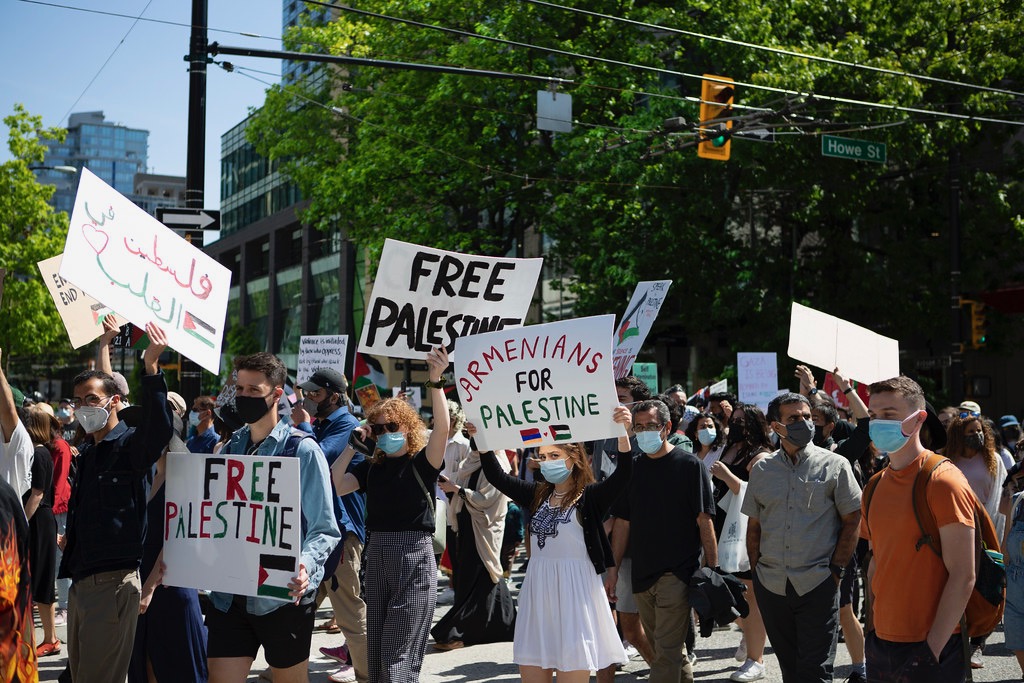
There is nothing quite as divisive as talking about the Israeli-Palestinian conflict, which is perhaps why many people do not explicitly voice their opinions on the matter. Expressing support for Palestine has long been equated by the Zionist narrative as a stance of intrinsic anti-Semitism. However, this association is purely a tool designed to prevent criticism of the Israeli government for its human rights violations and blatant mistreatment of civilians based on an agenda of ethnic cleansing.
Research into the conflict demonstrates that criticism is not only a political and humanitarian matter, but is also fundamentally necessary if we believe in half of the human rights we societally claim to endorse. Earlier this year, Human Rights Watch issued a historic report, ‘A Threshold Crossed’, which highlighted the severity of the situation for Palestinians, noting that Israeli authorities had “dispossessed, confined, forcibly separated, and subjugated Palestinians by virtue of their identity”. What seems like, simply, the conflict and struggle for Jewish existence is actually a means to try and prevent criticism that would hinder the Zionist agenda. The simple fact is that, if you believe in the universality of human rights and you stand for the principles laid out in the Universal Declaration of Human Rights, then there should be no question regarding your support for the Palestinian people.
Upon evaluation, Human Rights Watch concluded that, as a result of Israel’s explicit intent to “maintain domination of Jewish Israelis over Palestinians”, combined with systematic oppression and inhumane treatment, Israel is committing the crime of apartheid against the Palestinian people. Both South Africa and Namibia, states which have respectively overcome institutionalized racial segration, have moreover officially recognised Israel as operating a regime of apartheid, even suggesting potential means for the UN to investigate.
When violence sparked again in May of this year, it followed as a result of protests in East Jerusalem regarding the forced eviction of Palestinian families from their homes in Sheikh Jarrah and the consequent attacks in al-Aqsa Mosque by Israeli forces. As Mohammed el-Kurd noted, “the situation in Sheikh Jarrah is not hard to understand: it is a perfect illustration of settler colonialism, a microcosm of the reality for Palestinians across 73 years of Zionist rule”. Time magazine poignantly highlighted the discrepancy between Israel’s narratives regarding their treatment of Palestine and the rhetoric used by human rights organisations: “the Israeli Foreign Ministry has referred to the Sheikh Jarrah issue as a ‘real estate dispute’, [whilst] the United Nations human rights office has said their displacement could constitute a ‘war crime’”.
Online activism, particularly during this year’s resurgence of violence, has constituted a vital means of drawing attention to Palestinian rights. Through the use of Twitter, Snapchat, Instagram and Facebook, Palestinians have been able to share footage of their reality and mistreatment. Mohammed el-Kurd, for example, has used twitter to post to his hundreds of thousands of followers about the ongoing Palestinian crisis. The significance of Palestinian access to social media is that they are able to share real time updates on their story – through pictures, videos, or even speeches – therefore forcing a crack in the hegemonic Israeli narrative that has dominated traditional media for so long and enabled the crisis to continue spiralling.
Whilst many would argue that a mere social media post cannot spark change, the fact that young people are explicitly standing up for Palestinian rights highlights that people are gradually casting aside the stigma long associated with Palestinian advocacy; a stigma purely fabricated to prevent any form of challenge to the illegal expansion of Israeli settlements and human rights abuses. Furthermore, social media breaks through the barriers of conventional media, an avenue that can all too often manipulate facts or even downplay actions for political purposes. By sharing educational social media posts, users can encourage others to research the issue for themselves, cultivating a new and stronger era of Palestinian advocacy.
As a generation, it seems that many of us don’t hear much about the history of Israel and Palestine, subsequently, using social media to bring the issue onto the radars of our peers in this way, allows the severity of the oppression to reach a new audience and permeate the ‘mainstreamness’ of the issue, hopefully inspiring a butterfly effect of castigation for these continuous and systemic human rights violations.
This year alone, protests have occurred internationally, mobilised by the use of social media. Marches for Palestinian freedom took place all across the globe in places such as Paris, Berlin, Morocco and Dublin, as well as all over the UK, the US and more. Tens of thousands of Americans marched in cities including Dallas, Washington, New Orleans, etc and thousands gathered in London, with organisers estimating that Hyde Park saw more than 180,000 people showing solidarity with the Palestinian cause. Through such events, organisers wanted to emphasize that a ceasefire was not enough and that the UK government needed to implement actual sanctions on Israel. The demand for more action to be taken for Palestinians is a powerful indication that the international community is no longer willing to turn a blind eye to fundamental injustice and abuse.
All of this highlights that the narrative of the violence suffered by Palestians is being realised as not just one of ‘both sides’, but more so as a struggle of an oppressed nation which echoes “the struggles of Black Americans and Black South Africans during Apartheid”. The only way to begin dismantling such a system is exposure and awareness, so even if, hypothetically, only one person would be educated through a single social media post, it would still be worth sharing.
However, like it always happens with media cycles, the global momentum surrounding the Palestinian people has died down. Since the ceasefire was established, attention diminished as if the problem had been resolved, but the struggle is, sadly, still very much ongoing. As an international community, we have a responsibility to use our platforms – as well as our access to education – to continue speaking out about this apartheid regime and throw light on how states and International Organisations are failing the Palestinian people, subsequently permitting the continuation of one of the most degrading systems of injustice.
Image: Save Sheikh Jarrah Protest, 15th May 2021// GoToVan from Vancouver, Canada



Average Rating